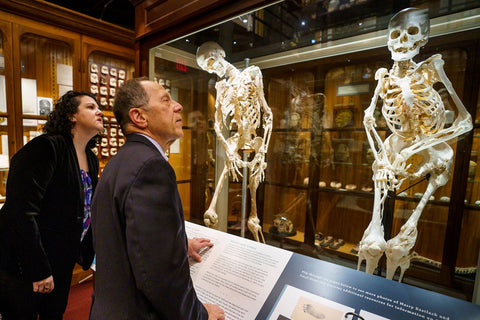Skulls Unlimited processes thousands of skulls yearly for hunters, professionals, and educators.
Learn more!


Recently, Skulls Unlimited worked with Philadelphia's Mütter Museum on a new specimen for their expansive collection of human skeletons. Our work was even featured in a National Geographic article. A local advocate, Carol Orzel, donated her body to the museum to raise awareness of life with Fibrodysplasia Ossificans Progressiva (FOP). FOP is a genetic condition where bone forms in connective tissues such as muscles, ligaments, and tendons. This is the only known condition where one organ system modifies into another. When we received Carol’s remains, it was evident just how painful this crippling disease must have been for her.
We also learned FOP is frequently misdiagnosed as often as 80 percent or more of the time due to a lack of knowledge among doctors, being mistaken for bone cancer most commonly. This rare disease is a genetic condition that does not exhibit any patterns across race or sex. FOP has been confirmed in 285 individuals in the United States and 800 individuals around the world.
By carrying out Carol's wishes and preserving her skeleton for students, physicians, and the general public, we will have contributed our part to increase awareness of this rare diseases and those individuals living with it.
Our founder began this journey at Skulls Unlimited with education as one of our fundamental core values. We believe Carol’s donation will spur a long-term solution towards the diagnosis and care for people afflicted with FOP.
To learn more about our contributions to science, follow our blog. To see the full extent and variety of our work, view our full collection.
In this photo, the lower portion of the skull, jaw, and cervical (neck) vertebrae is visible. There is an additional bony structure fusing the skull to the rest of the skeleton where the nuchal ligament and neck muscles would be located.
To read more about Carol’s progression of FOP and her life as an advocate, view the full story by The Philadelphia Inquirer.
0 of 3 items selected
Leave a comment